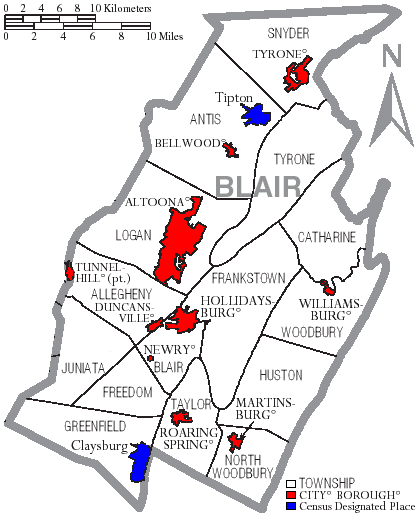 Map of Blair County Pennsylvania With Municipal and Township Labels - from Wikimedia Commons Map of Blair County Pennsylvania With Municipal and Township Labels - from Wikimedia Commons ProGen is a study group to encourage professional and aspiring genealogists.[1] Each month, participants read sections of Professional Genealogy: Preparation, Practice and Standards[2] and Genealogy Standards.[3] In conjunction with the readings, they write up an assignment, and review the work of their fellow students, offering constructive comments. Each month, students meet online in an hour-long discussion about the readings or assignment. The strength of the program is the peer-feedback. I described it to someone recently as “the ultimate pyramid scheme” – but in a really really good way! Think about it. You read a chapter and write up an assignment. Then you turn in your assignment and you get to see seven other people’s take on the same assignment! They give you feedback on your work – a great benefit. But even better is you get the chance to analyze their work. You think about “Why did they include that?” “Will I include that when I do something like that in the future?” “Does one format work better than another for this kind of product?” “Paragraphs or bullet points?” “Hyperlinks – yes or no?” “How would I approach my colleague’s problem?” And then, you get to read each other’s feedback on the other assignments. “Hmmm… I didn’t even notice that thing that he pointed out… I’ll have to look out for that in the future.” There is learning on so many levels in this kind of a peer-feedback environment – when you write your own work, get critiques on your own work, mentally analyze someone else’s work, formulate useful coherent comments on other’s work, and read the analyses of other people on the same work. As I said, I now have the chance to mentor a group of ProGen students. This month their assignment was to write a locality guide. As a group they’ve turned in guides for Italy, Ireland, Belarus, Connecticut, Missouri, Pennsylvania, Oregon, Indiana and more – sometimes at a county level, sometimes at a state level. Each one of these I read has resources I’ve never seen. While I might not have ancestors in each specific locality, I can learn about types of records and strategies from each of them. “Hmm… Franklin County, Pennsylvania has xyz? Does Blair County where my people lived have those same kind of records? I’ll have to look for those!” I did many of the same assignments when I was a student in ProGen four years ago. But I’ve decided that I’m going to do the same assignments as the students in my group are doing. I’m in the thick of some research on my Bradley family – my great-grandfather Peter Bradley (1808-1861) and his nine siblings – five brothers and four sisters – at least eight of whom emigrated from County Tyrone, Ireland and settled in several counties in western Pennsylvania between about 1830 and 1850. I think a locality guide for each of these counties will help me to understand more about my Bradleys. For a link to my locality guide for Blair County, Pennsylvania, click here. [1] ProGen Study Groups (https://www.progenstudy.org/). [2] Elizabeth Shown Mills, CG, CGL, FASG, ed. Professional Genealogy: Preparation, Practice & Standards (Baltimore, Maryland: Genealogical Publishing Company, 2018). [3] Board for Certification of Genealogists, Genealogy Standards, 2nd ed. (Nashville, Tennessee: Ancestry.com, 2019).
1 Comment
|
AuthorMary Kircher Roddy is a genealogist, writer and lecturer, always looking for the story. Her blog is a combination of the stories she has found and the tools she used to find them. Archives
April 2021
Categories
All
|
